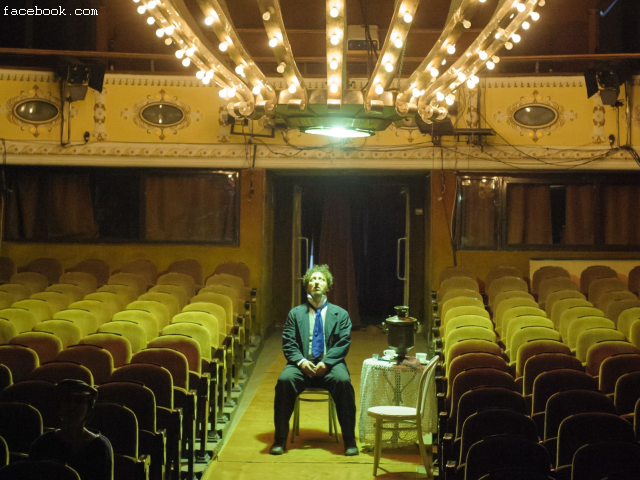The Hungarian State Theatre in Cluj, western Romania, celebrated 225 years
In early December this year, the Hungarian State Theatre in Cluj, western Romania, staged its traditional mini-season, which takes place every other year.

Luana Pleşea, 05.01.2018, 14:32
In early December this year, the Hungarian State Theatre based in Cluj, western Romania, staged its traditional mini-season, which takes place every other year. And because in 2017 the theatre celebrated 225 years since the foundation of the first theatre company performing in Hungarian, the mini-season also included some of the most important premieres of the previous seasons, signed by the directors who marked the artistic development of the theatre company and contributed to its consolidation. Since 1990 Director Gabor Tompa has been the manager of the Hungarian State Theatre in Cluj.
The mini-season started with the famous Uncle Vanya, directed by Andrei Serban. Here is Gabor Tompa with details: “I believe we still had the chance of having a couple of masterpieces included in our repertoire and we focused on four major directors who staged exceptional shows including ‘Uncle Vanya;, directed by Andrei Serban. This show has been a constant sold-out in the past 11 years and we usually run out of tickets two months ahead of every performance. Then we also had ‘Victor or Power to the Children’, the year’s best show directed by Silviu Purcarete, a director who contributed a lot to the Hungarian Theatre. Then there was also ‘The Celebration’, under the guidance of Robert Woodruff. ‘Victor’ has been performed in three seasons, ‘the Celebration’ in five, but ‘Uncle Vanya’ in eleven seasons. I’d also mention Yuri Kordonsky’s ‘The Lower Depths’. I can safely say there are four different masterpieces. We have also chosen a show staged by Botond Nagy, a director belonging to the youngest generation, who has just got a master’s degree in Targu Mures. He directed a play by Maeterlinck called ‘The Blind’.”
Chekhov’s ‘Uncle Vanya’ has so far won three UNITER awards: best show in 2007, best director (Andrei Serban) and best actor (Andras Hathazi). It also reaped the Hungarian Theatre Critics Award for best show in the 2007-2008 season. ‘Victor, or Power to the Children’ by Roger Vitrac, has also got the UNITER award for best show in 2013. Thomas Vinterber’s ‘Celebration’ had two UNITER nominations, while Yuri Kordonsky was a UNITER recipient for best director in 2016. But how do these masterpieces by these great directors fit into the two-century existence of the Cluj Hungarian Theater?
Director Gabor Tompa believes that when it comes to theater it is very hard to defer to tradition, because nowadays theater is nothing like it was 10 years ago, let alone 225 years ago: “Theater is the art of the moment, of the present. But there’s something else… I thought if I could link the present moment, if I could possibly connect to this history, this tradition. And if we follow the entire history of this theater, we find out that the most important moments were those when a few directors, theater people, brought in something new. Be it a Shakespeare series in the 19th century, which was quite unusual then, or building a cinema studio, combining cinema with theater early on, in the 1910s and 1920s, or experimental attempts, which were characteristic of great director Gyorgy Harags work. So then I thought, if we had a tradition of our own, it would be the tradition of the permanent renewal of the means of expression, constantly taking risks, without which I believe theater would become canonized, rigid, even dead. I believe that we have always held onto the model of permanent renewal, which to us is a reference point, a tradition that we can carry on.”
According to manager Gabor Tompa, over 40% of the audience of the Hungarian Theater at present is not ethnic Hungarian, and the message that it wants to convey is that this theater belongs to the people of Cluj, and not only.
Theater critic Oana Cristea Grigorescu, a journalist at Radio Romania, has for many years followed the productions of the Hungarian State Theater in Cluj and the impact they had and still have in Romanian theater: “I believe the Hungarian State Theater is at the vanguard of a cultural revival in the city of Cluj, which later extended to other cities of Romania. And I am referring to the opening of the theaters in the Hungarian and German language towards the Romanian culture, in the sense that they provided Romanian subtitles for the plays they staged. The barriers, which we had considered natural up to that moment, were broken, but those barriers were not normal, actually. The city of Cluj had a lot to gain from this move. After a first stage, when the Hungarian community expressed discontent with the new repertory option and with the loss of the unique target of preserving the Hungarian identity, the major gain of this repertory policy was the fact that, in Cluj, theater audiences that went to see the shows of the Hungarian Theater, the National Theater or of the independent theaters broke free from ethnic barriers. And the audiences’ free movement and interest for theater gave rise to an effervescence that fueled all forms of theater made in Cluj. I believe this is a good example of how multiculturalism can enrich us, can help us break barriers, of how it can boost the consistency of a community focused on culture, theater or any other art.”






























